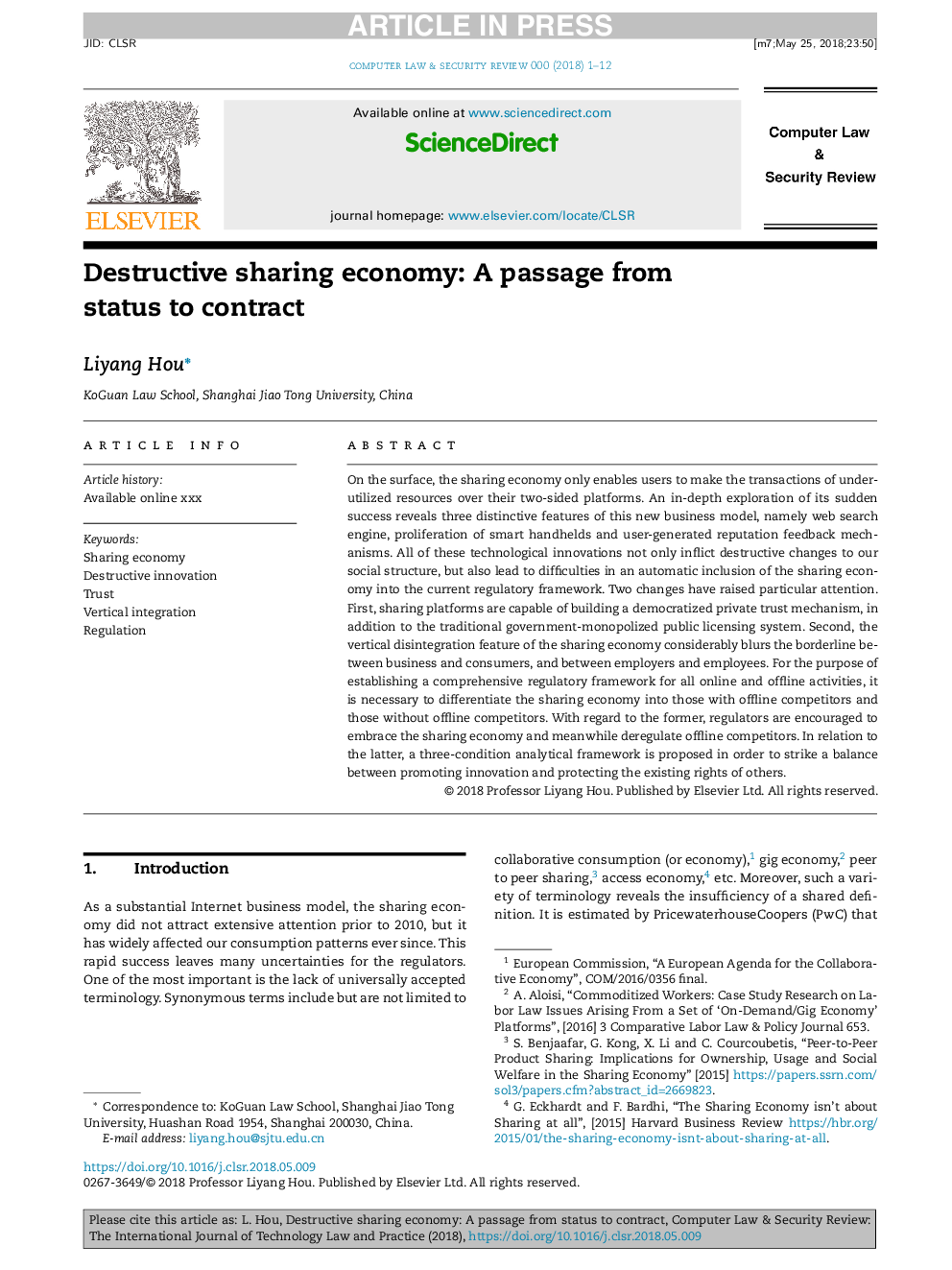| کد مقاله | کد نشریه | سال انتشار | مقاله انگلیسی | نسخه تمام متن |
|---|---|---|---|---|
| 6890452 | 1445186 | 2018 | 12 صفحه PDF | دانلود رایگان |
عنوان انگلیسی مقاله ISI
Destructive sharing economy: A passage from status to contract
ترجمه فارسی عنوان
اقتصاد به اشتراک گذاری مخرب: گذر از وضعیت به قرارداد
دانلود مقاله + سفارش ترجمه
دانلود مقاله ISI انگلیسی
رایگان برای ایرانیان
کلمات کلیدی
به اشتراک گذاری اقتصاد، نوآوری مخرب، اعتماد، ادغام عمودی، مقررات،
ترجمه چکیده
در سطح، اقتصاد به اشتراک گذاری تنها کاربران را قادر می سازد که معاملات را از منابع تحت بهره برداری بیش از سیستم عامل های دو جانبه خود انجام دهند. اکتشاف عمیق در مورد موفقیت ناگهانی آن، سه ویژگی متمایز از این مدل کسب و کار جدید را نشان می دهد، یعنی موتور جستجو در وب، گسترش دستگاه های دستی هوشمند و مکانیسم های بازخورد اعتبار دهنده ایجاد شده توسط کاربر. همه این نوآوری های تکنولوژیک نه تنها تغییرات مخرب را به ساختار اجتماعی ما تحمیل می کنند، بلکه سبب ایجاد مشکل در ورود خودکار اقتصاد به اشتراک گذاری در چارچوب قانونی کنونی می شوند. دو تغییر توجه خاصی را به خود جلب کرده است. اولا، سیستم عامل های به اشتراک گذاری، علاوه بر سند صدور مجوز عمومی دولتی سنتی دولتی، می توانند مکانیسم اعتماد خصوصی ایجاد کنند. دوم، ویژگی تقسیم عمودی اقتصاد اشتراکی، مرز بین کسب و کار و مصرف کنندگان و بین کارفرمایان و کارفرمایان را به طور قابل توجهی تار می کند. برای ایجاد یک چارچوب قانونی جامع برای تمام فعالیت های آنلاین و آفلاین ضروری است که اقتصاد به اشتراک گذاشته شده را به افرادی که دارای رقبای آفلاین و کسانی هستند که بدون رقبا آفلاین نیستند، تمایز دهند. با توجه به سابق، رگولاتورها تشویق می شوند تا اقتصاد اشتراکی را در نظر بگیرند و در عین حال رقبای آفلاین را از بین ببرند. در رابطه با دوم، چارچوب تحلیلی سه گانه پیشنهاد شده است تا تعادل بین ترویج نوآوری و حفاظت از حقوق موجود دیگران را ایجاد کند.
موضوعات مرتبط
مهندسی و علوم پایه
مهندسی کامپیوتر
علوم کامپیوتر (عمومی)
چکیده انگلیسی
On the surface, the sharing economy only enables users to make the transactions of under-utilized resources over their two-sided platforms. An in-depth exploration of its sudden success reveals three distinctive features of this new business model, namely web search engine, proliferation of smart handhelds and user-generated reputation feedback mechanisms. All of these technological innovations not only inflict destructive changes to our social structure, but also lead to difficulties in an automatic inclusion of the sharing economy into the current regulatory framework. Two changes have raised particular attention. First, sharing platforms are capable of building a democratized private trust mechanism, in addition to the traditional government-monopolized public licensing system. Second, the vertical disintegration feature of the sharing economy considerably blurs the borderline between business and consumers, and between employers and employees. For the purpose of establishing a comprehensive regulatory framework for all online and offline activities, it is necessary to differentiate the sharing economy into those with offline competitors and those without offline competitors. With regard to the former, regulators are encouraged to embrace the sharing economy and meanwhile deregulate offline competitors. In relation to the latter, a three-condition analytical framework is proposed in order to strike a balance between promoting innovation and protecting the existing rights of others.
ناشر
Database: Elsevier - ScienceDirect (ساینس دایرکت)
Journal: Computer Law & Security Review - Volume 34, Issue 4, August 2018, Pages 965-976
Journal: Computer Law & Security Review - Volume 34, Issue 4, August 2018, Pages 965-976
نویسندگان
Liyang Hou,
